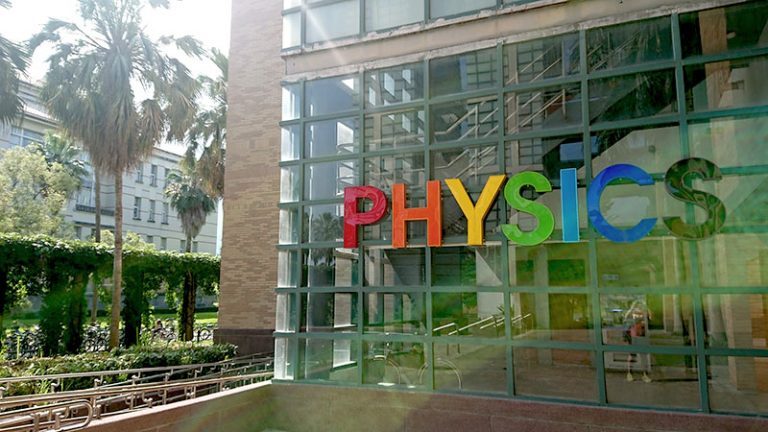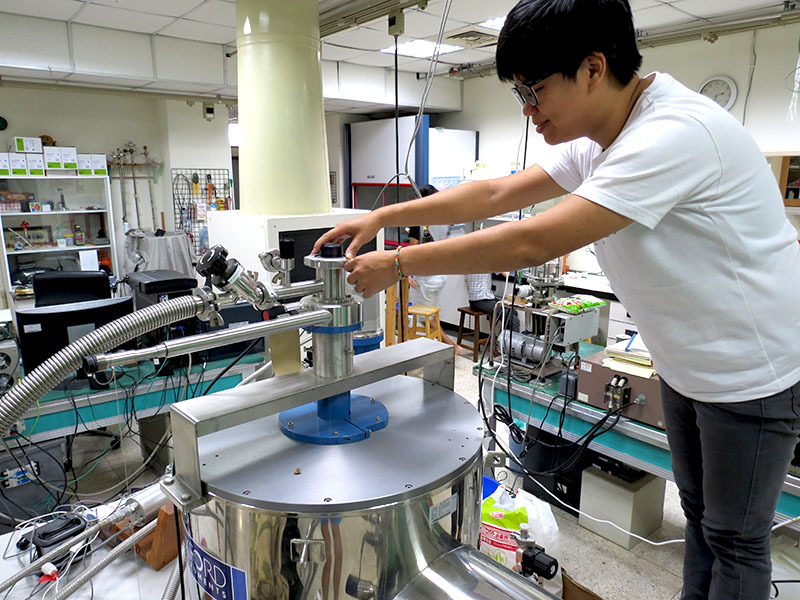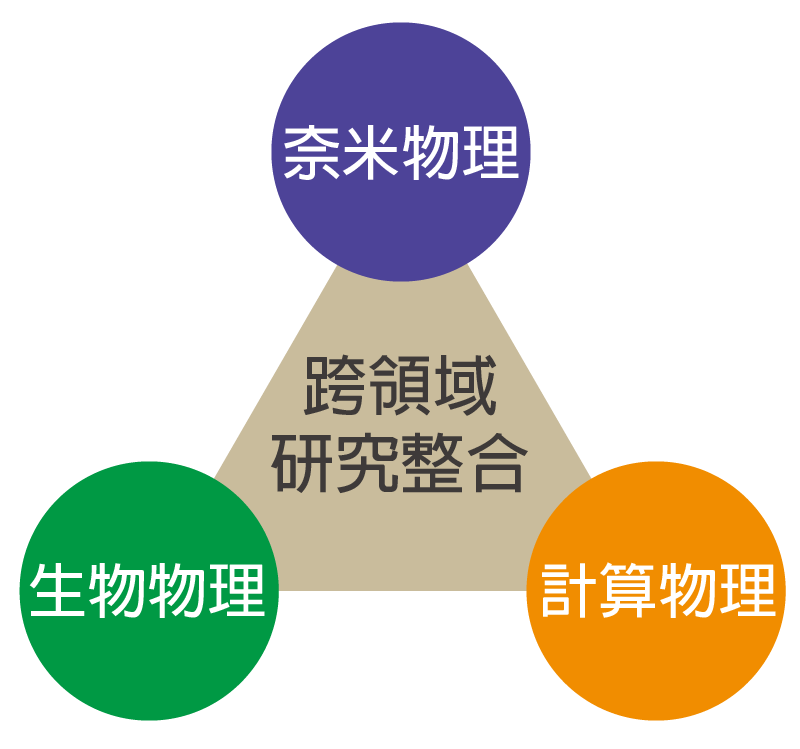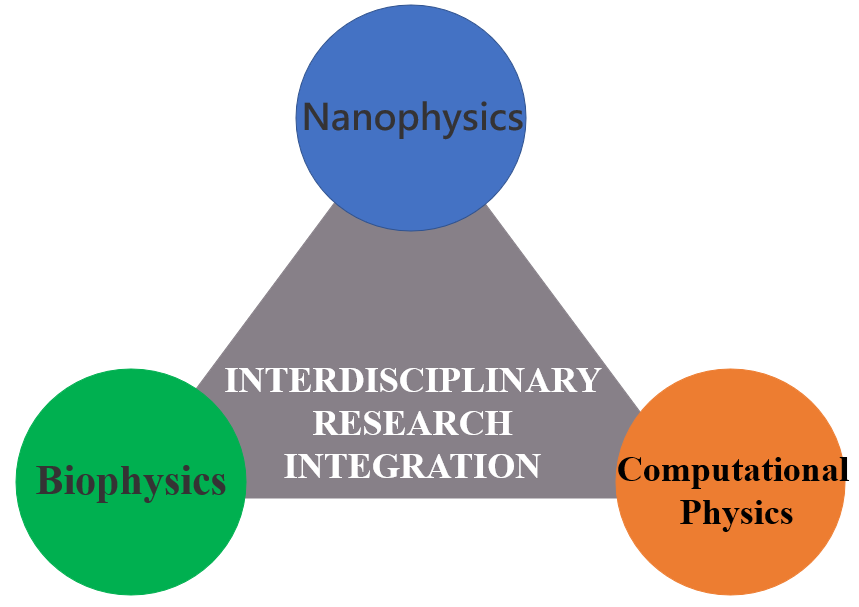系所簡介 Department Introduction
物理系簡介
物理學系大學部成立於民國86年,民國90年成立應用物理碩士班,博士班於民國92年成立,現任專任教師共18人,技術師1人及行政助理2人。為因應高科技產業對奈米光電與物理人才的需求,並維持物理系競爭力,於98學年度起擴大招收大學部學生共60名,招生方式分成「奈米與光電科學組」20名及 「物理組」40名之兩組,且大學部課程採學程化設計,除物理基礎必修學程外,專業選修學程分為奈米與光電物理學程、理論與計算物理學程及生物與材料物理學 程三大學程。
本系自成立以來已完成設立普通物理實驗室、大二及大三基礎物理實驗室與計算物理等教學實驗室,為有效提升學生在電子學課程的學習成效,並增加大三基礎 物理實驗的實作訓練,目前積極籌備成立應用電子學實驗,也陸續規劃各教學實驗室之間的整合,以期在資源有限條件下,達成最大教學效益。為擴充實驗教學資 源,在近年執行教育部核准的「教學卓越計畫」過程中,已完成設立第二普通物理實驗室,大幅降低普通物理實驗各班級人數;大二基礎物理實驗課程中,已新增使 用多種感應器進行測量之實驗設計,可在學習自動控制與自行組合設計實驗過程中,強化學生動手設計實驗之興趣與能力,提高教學成效。此外,部分課程利用「數位學習平台-東華e學苑」提供的教學互動平台,學生可透過網路進行指定習作或取得補充教材自修,更增加師生互動的多樣性管道。
除了硬體設備隨各教學實驗室與教授研究實驗室擴充逐年成長外,本系根據教授研究教學與學生學習所需,每年編列圖書預算以採購物理相關圖書。全體師生更可透過網路使用AIP、APS、Elsevier等出版商提供的上百種物理全文網路期刊,能夠快速地取用完整的期刊資訊。然而為因應未來數年基礎科學領域的研究人員與學生人數逐年增加,本校將責無旁貸地向政府爭取設立宜花東地區物理圖書中心及貴重儀器中心,以落實東部地區科學教育與研究發展的基礎建設。大學部學生參與教授研究與實驗室團隊為本系特色之一,特別鼓勵大學部學生提早接受教授指導進行科學研究,尤其可申請國科會大專生研究專題計畫;經由實作研 究經驗啟發學生的研究興趣、能力與視野,並配合本系大學部專題研究課程、書報討論、學士論文、研究成果發表與競賽等活動,包括鼓勵優秀學生參與國際會議發 表研究成果,藉由系統科學思維、解決問題與討論、表達等能力訓練,賦予本系畢業學生升學研究所或就業時的表現競爭力。 本系應用物理研究所(碩士、博士班)教育宗旨在於培育具獨立研究能力之專才,尤其重視專業整合,配合科技發展趨勢設計主題課群,以生物物理、計算物理、奈 米光電物理與凝態物理為核心領域,提供整合專業知能的訓練,滿足研究所畢業生未來在學術進修或各領域就業時的專業背景需求。本系更設有獎勵辦法鼓勵學生參 加國際學術研討會,凡獲得國科會補助者,本系將再給予額外補助,減輕其參加國際會議的負擔,提高學生出國參加會議的意願,如此可提升學生之研究與國際視野,增加其與國外研究團隊交流與互動以及自我表現機會,有助於提升學生日後申請出國深造或就業時的競爭力與機會。
本系目前現任專任教師共17人,合聘教授1人、客座教授1人;本系整體之研究表現優異,尤可見於近三年本系教師發表於SCI期刊上之論文可觀數量,2007年至2009年專任教師人數平均14.3人,每年發表SCI期 刊論文平均數35.3篇,即每人每年發表平均數2.4篇。 與國家理論科學中心合作之主題研討小組(Focus Group),以及承辦各類暑期學校為本系具特色之學術活動。東華暑期學校(East Formosa Summer School,EFSS)始自民國92年,每年暑期選定一個研究領域為主題,邀請該領域之國內外著名學者,進駐東華進行為期一週的學術講學,藉以激發國內 相關研究領域的研究與合作,並提升研究水準。目前已舉辦4屆東華暑期學校,並於2010年承辦「第十四屆台灣核物理」暑期學校,每屆暑期學校參加人數總計 約100人,其經營與促成學術合作的影響獲得許多正面評價。另外,本系除不定期舉辦大型國際研討會外,各教師在其研究相關領域上已與東西部重點學術單位建 立實質合作關係,包括與慈濟大學、中央研究院物理所高能組及、基因體中心、複雜系統組及原分所等研究的研究合作,此合作內容亦包含執行持續進行中的許多跨領域研究計畫。

發展規劃與特色
本系自成立以來已斥資千萬設立完成普通物理實驗室、大二及大三基礎物理實驗室、計算物理等實驗室,目前正進行設立生物物理實驗室與應用電子實驗室,並陸續規劃各實驗室之間的整合,期望在有限經費下,達成其最大的教學利益。日前藉由教育部「教學卓越計畫」經費的補助,已完成第二普通物理實驗室的設立,大大降低了普通物理實驗課的班級修課人數,以提高教學效果。
除了各教學實驗室、教授研究實驗設備隨系所逐年成長,本系每年編列圖書預算以採購物理相關圖書,提供教授研究教學與學生學習的需要,更可透過網路使用 AIP、APS、Elsevier…等出版商上百種的物理全文網路期刊。然而為因應教師與學生對於教學及研究上的需求,本校將責無旁貸地向政府爭取宜花東地區物理圖書中心及貴重儀器中心的設立,以落實東部地區科學教育與研究的基礎建設。
大學部學生參與實驗室研究為本系最大的特色。本系特別鼓勵大學部學生積極參與教授的專題或實驗室研究,提早接受教授指導及獲取實際的研究經驗。學生亦可申請國科會大專生研究專題,以參與尖端科學研究工作。其相關配合課程包括大學部專題研究、書報討論、學士論文、研究成果發表與競賽…等,這些訓練將成為本系畢業學生就讀研究所時最紮實的基礎。

研究方向整合
系所具有之特色與競爭優勢:研究整合
系所研究的合作與整合,除了各教師獨立研究之外,亦顧及實驗與理論的相互支援與配合,本系將每位老師的研究專長整合發展為三個跨領域研究群。
* 奈米物理研究群:
研究群成員:郭永綱教授、馬遠榮教授、吳勝允教授、葉旺奇副教授、黃玉林副教授、曾賢德副教授、賴建智教授
* 計算物理研究群:
研究群成員:李大興教授、林子強教授、張俊明副教授、陳企寧助理教授、劉承邦教授、紀信昌副教授、葉振斌教授
* 生物物理研究群:
研究群成員:鄭嘉良教授、柯學初教授、彭文平教授
這些領域的重要性在於它們不僅包含了傳統物理的基礎研究,更和廿一世紀新興的科技─生命科學、環境科技、和海洋科技有很重要的關聯性;其不僅可以提升國內此類科學的研究發展,而且可符合本校整體、務實科技發展之理念與發展方針;這些領域與本校其他的系所,例如應用數學、化學、生命科學、材料科學、資訊工程、和電機工程等,也有極密切的關聯與整合特性。

Department of Physics Overview
The Department of Physics at National Dong Hwa University was established in 1997. The Master’s Program in Applied Physics was launched in 2001, followed by the Ph.D. program in 2003. The department currently has 18 full-time faculty members, one technical specialist, and two administrative assistants. To meet the growing demand for nanophotonics and physics professionals in the high-tech industry and maintain our competitiveness, the undergraduate program expanded in 2009 to admit 60 students annually: 20 in the Nanophotonics and Optoelectronics Science Track and 40 in the Physics Track. The undergraduate curriculum is structured with a core and three elective modules: Nanophotonics and Optoelectronic Physics, Theoretical and Computational Physics, and Biophysics and Materials Physics.
We have established various teaching laboratories including general physics, second- and third-year fundamental physics, and computational physics. Currently, we are setting up an applied electronics lab and planning the integration of teaching labs to optimize educational outcomes. Supported by the Ministry of Education’s Teaching Excellence Project, a second general physics lab has been established, significantly reducing class sizes. The second-year experimental physics curriculum includes sensor-based experiments, enhancing hands-on design abilities. Some courses utilize the NDHU e-Learning Platform to facilitate student-teacher interaction and access to supplementary materials.
Each year, we allocate a budget for purchasing physics-related books to support both teaching and research. Faculty and students also have access to hundreds of full-text online journals from publishers like AIP, APS, and Elsevier. NDHU is committed to advocating for the establishment of a Physics Library Center and a Precision Instrument Center in the Yilan-Hualien-Taitung region to support the scientific infrastructure of eastern Taiwan.
A signature feature of our department is encouraging undergraduates to join research teams and work under faculty guidance early in their studies. Students may apply for research projects funded by the National Science and Technology Council. This hands-on experience is complemented by research projects, seminars, thesis writing, and conference participation. Outstanding students are encouraged to present their work at international conferences, enhancing their research capabilities, global vision, and competitiveness for graduate study or employment.
The graduate programs aim to nurture independent researchers with strong interdisciplinary skills. Core research areas include Biophysics, Computational Physics, Nanophotonics, and Condensed Matter Physics. Training is designed to meet the academic and professional demands of the future. Students are encouraged to attend international conferences, with financial support offered to those who receive national grants, further promoting their research and global engagement.
Currently, the department consists of 17 full-time faculty, one jointly appointed professor, and one visiting professor. From 2007 to 2009, our faculty published an average of 35.3 SCI journal papers annually. Collaborative academic activities include topic-based focus groups with the National Center for Theoretical Sciences and the East Formosa Summer School (EFSS), held annually since 2003. Each summer, EFSS invites renowned scholars for a week of lectures on a chosen topic, enhancing domestic collaboration and research quality. By 2010, EFSS had hosted four events including the 14th Taiwan Nuclear Physics Summer School. In addition to international conferences, faculty maintain strong research partnerships with institutions like Tzu Chi University and Academia Sinica.

Development Plans and Features
Since its establishment, the department has invested significantly in teaching and research laboratories, including general physics, fundamental physics for sophomores and juniors, and computational physics. We are now developing biophysics and applied electronics labs and planning to integrate existing labs to enhance teaching efficiency. The recently established second general physics lab significantly reduced class sizes and improved teaching effectiveness, supported by the Ministry of Education’s Teaching Excellence Project.
In addition to expanding physical facilities, we allocate annual budgets to purchase physics-related books and ensure access to hundreds of full-text online journals. To meet future needs, we are committed to establishing a Physics Library Center and a Precision Instrument Center for the Yilan-Hualien-Taitung region, supporting scientific education and research development.
One of our department's hallmarks is encouraging undergraduate participation in laboratory research. Students are urged to engage early in faculty-led research projects, gaining valuable experience. They may also apply for research projects funded by the National Science and Technology Council. This experience, supported by courses such as Undergraduate Research, Seminars, Thesis Writing, and Research Competitions, prepares students for graduate school and professional careers.

Integrated Research Directions
The department integrates faculty research expertise into three interdisciplinary research groups:
- Nanophysics Group: Prof. Yung-Kang Kuo, Prof. Yuan-Ron Ma, Prof. Sheng-Yun Wu, Assoc. Prof. Wang-Chi Yeh, Assoc. Prof. Yu-Lin Huang, Assoc. Prof. Shien-Der Tzeng, Prof. Chien-Chih Lai
- Computational Physics Group: Prof. Da- Shin Lee, Prof. Chi-Yong Lin, Assoc. Prof. Chun-Ming Chang, Asst. Prof. Chi-Ning Chen, Prof. Cheng-Pang Liu, Assoc. Prof. Hsin-Chang Chi, Prof. Chen-Pin Yeh
- Biophysics Group: Prof. Chia-Liang Cheng, Prof. Shyue-Chu Ke, Prof. Wen-Ping Peng
These research areas not only encompass fundamental physics but also connect with emerging technologies in life sciences, environmental science, and marine science. The interdisciplinary nature aligns with NDHU's development goals and facilitates collaboration with other departments such as Applied Mathematics, Chemistry, Life Science, Materials Science, Computer Science, and Electrical Engineering.

